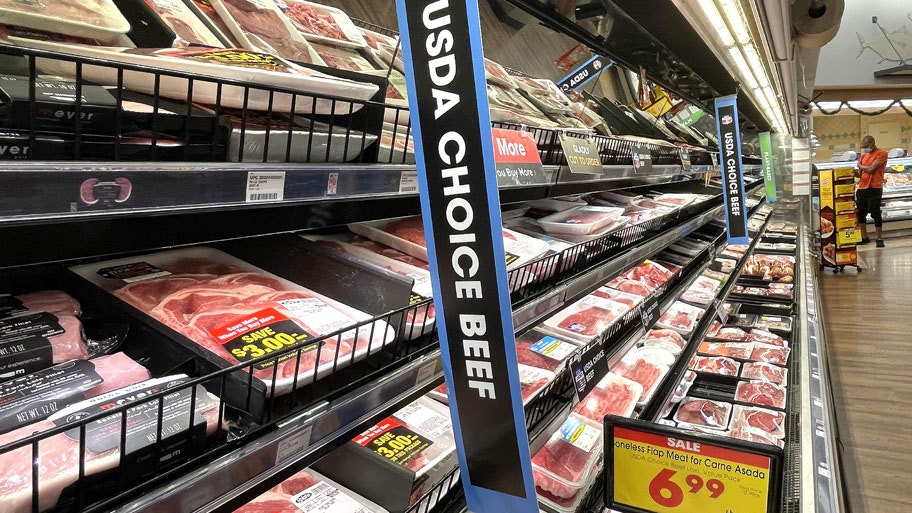Wyoming ranchers and farmers say they feel targeted by new federal dietary guidelines that say Americans should eat less beef and drink less whole milk.
The recommendations are in the latest from the federal Dietary Guidelines Advisory Committee, which have left the agriculture industry asking what science is being followed to come to conclude that beef especially is bad for health and leads to obesity.
“Every time they come out with it (the guidelines), it's kind of frustrating,” said Dennis Sun, editor of Wyoming Livestock Roundup, from his ranch, the M&D Land Co. “I don't really know who's behind it, but they do seem to be politically motivated.”
The Wyoming Stock Growers Association will host its convention in Casper later this year, and Executive Vice President Jim Magagna is anticipating that the committee’s recommended guidelines will be on the agenda.
“We'll probably be looking at developing an actual policy on it but our stance, just based on our general policy, is clear that we'll be strongly opposed to it,” Magagna said. “As I understand it, at some point, the guidelines will be out for a 30-day public comment period, and I fully anticipate and intend to submit comments in opposition to it.”
Latest Federal Dietary Guidelines
The federal committee recommends that the most positive health habits include a diet with a relatively higher intake of vegetables, fruits, legumes, whole grains, low- or nonfat dairy, lean meats and poultry, seafood, nuts and unsaturated vegetable oils.
It is encouraging Americans to lower their intake of red and processed meats, sugar-sweetened foods and beverages, and refined grains. The committee reports that consumption of these foods are associated with detrimental health outcomes.
It’s disappointing, but not a surprise that the beef and dairy industries are under such negative scrutiny, Sun said.
“It’s been kind of the standard story,” Sun said about the less beef recommendation. “I guess people need to look and see who's making that decision and who they're associated with.”
Like Sun, Magagna said he thinks the recommendations are political.
“I think it's just another example of where some radical interests have tried to take over,” Magagna said. “As I understand, this advisory committee just added this as sort of a very last-minute thing into their recommendations.”
Magagna believes that the removal of red meat from American’s diets is part of a broader attack on the beef industry.
“This approach is being driven by some of the same interests that don't want to see any beef, any cattle on the land because of climate change and carbon and methane, and others who don't want to see the processing of animals because it's deemed cruel and inhumane,” he said. “You know, there's just the undertone that seems to be driving so much of the discussion in this country today.”
Defending The Beef Industry
The University of Nebraska published a report about the benefits of beef and, among other things, that beef is a high source of protein, selenium, vitamin B-12, phosphorus and zinc. It also found that beef is a good source of niacin, riboflavin, iron and vitamin B-6.
Harvard's T.H. Chan School of Public Health disagrees and reports that this advice about the benefits could potentially harm people's health.
“Processed meat products contain high amounts of additives and chemicals, which may contribute to health risks,” according to a statement from Harvard. "Again, there is not a specific amount that is considered safe, so you should keep processed meat intake to a minimum.”
Ranchers disagree and continue to cite the benefits of red meat.
“I don’t know if many people even pay attention to the committee’s guidelines, because they've shown that some of the fatty acids in meat are good for you,” Sun said. “Red meat is high in iron, and it's got a lot of minerals.”
Magagna said that science supports eating red meat in moderation.
“Beef or red meat in general is demonstrated to be a critical part of our diets and very healthy because it provides strong nutrients and protein in particular,” Magagna said. “The fact that the average American is going to get all their needs met for those nutrients by eating beans and lentils is just unrealistic.”
Magana believes that eating beef is an American’s right and that the federal government should not interfere with their diets, especially when it seems more politically motivated rather than scientific.
“That’s simply not the way we live,” he said. “I hope that the USDA, when they actually issue their new standard, will be sensible and ignore this and look in terms of what's important, not only because it's helpful and good for people, but because consistent with what people like eat, how they want to live their lives.”
Jackie Dorothy can be reached at jackie@cowboystatedaily.com.





